Relationship Marketing: Strategies for Consumer Retention and Loyalty
VerifiedAdded on 2022/09/30
|17
|3539
|364
Report
AI Summary
This report provides a comprehensive overview of relationship marketing (RM), emphasizing its significance in building and sustaining long-term customer relationships. It delves into the concept of RM, contrasting it with traditional transactional marketing, and highlights the importance of RM strategies in fostering customer loyalty, retention, and brand recognition. The report explores the key focus and implementation of RM strategies, including the use of CRM and marketing automation tools. It also examines various types of RM relationships, such as normal, antagonistic, distant, and close relationships. Furthermore, the report discusses the application of RM in different contexts, including customer relationships (CRM) and relationships with channel members (B2B). The report concludes by underscoring the importance of RM in ensuring customer satisfaction, driving repeat purchases, and achieving sustainable business growth.
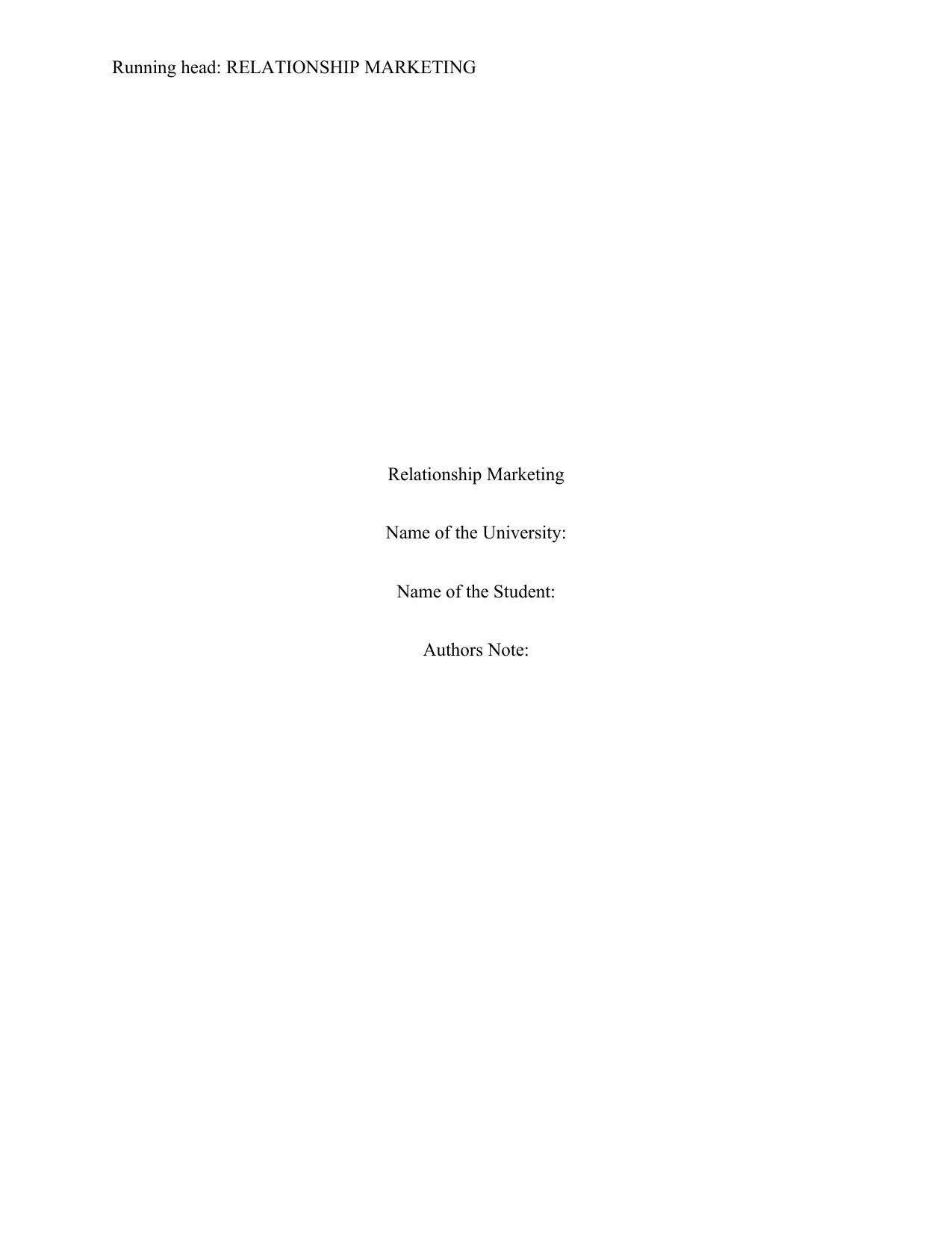
Running head: RELATIONSHIP MARKETING
Relationship Marketing
Name of the University:
Name of the Student:
Authors Note:
Relationship Marketing
Name of the University:
Name of the Student:
Authors Note:
Paraphrase This Document
Need a fresh take? Get an instant paraphrase of this document with our AI Paraphraser
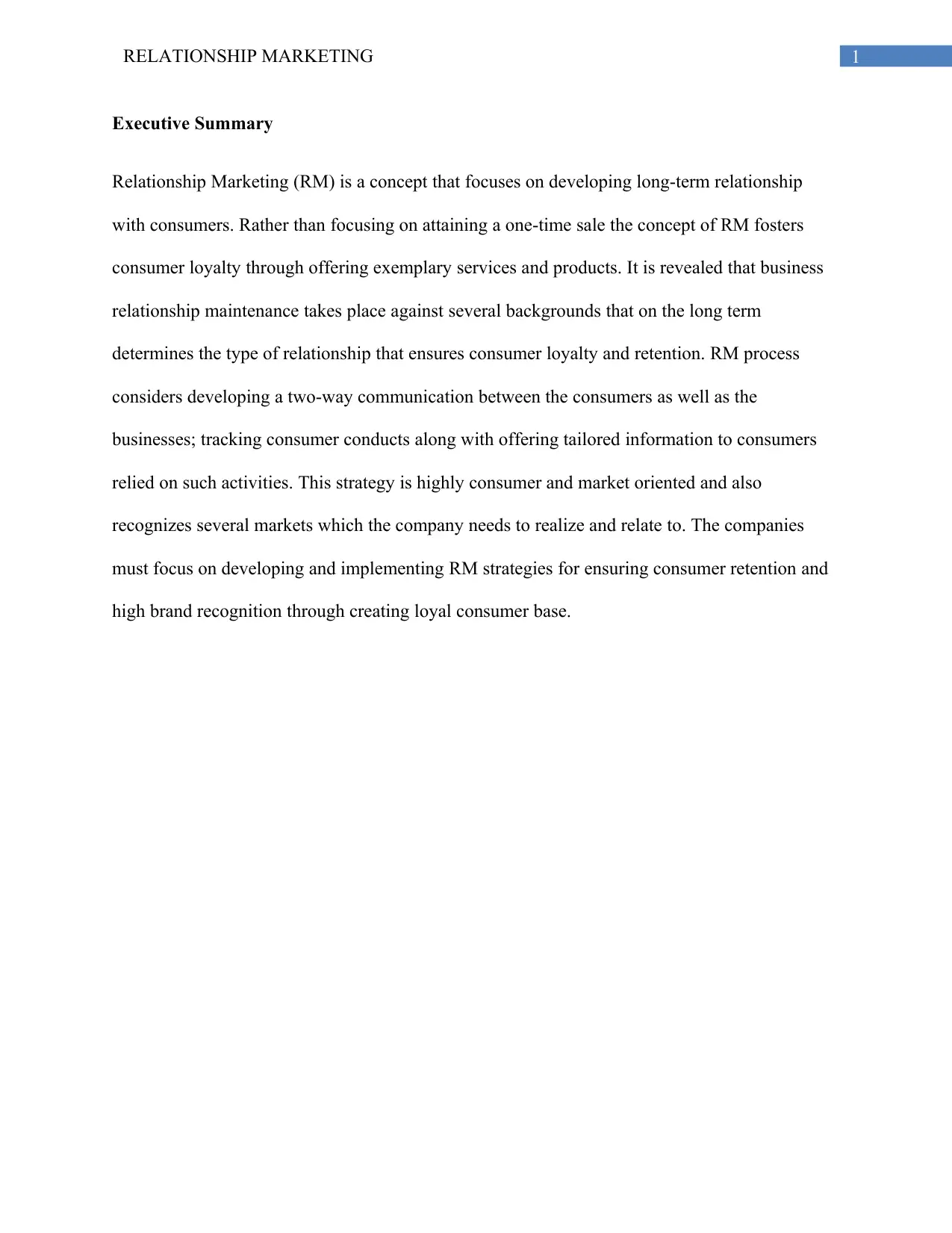
1RELATIONSHIP MARKETING
Executive Summary
Relationship Marketing (RM) is a concept that focuses on developing long-term relationship
with consumers. Rather than focusing on attaining a one-time sale the concept of RM fosters
consumer loyalty through offering exemplary services and products. It is revealed that business
relationship maintenance takes place against several backgrounds that on the long term
determines the type of relationship that ensures consumer loyalty and retention. RM process
considers developing a two-way communication between the consumers as well as the
businesses; tracking consumer conducts along with offering tailored information to consumers
relied on such activities. This strategy is highly consumer and market oriented and also
recognizes several markets which the company needs to realize and relate to. The companies
must focus on developing and implementing RM strategies for ensuring consumer retention and
high brand recognition through creating loyal consumer base.
Executive Summary
Relationship Marketing (RM) is a concept that focuses on developing long-term relationship
with consumers. Rather than focusing on attaining a one-time sale the concept of RM fosters
consumer loyalty through offering exemplary services and products. It is revealed that business
relationship maintenance takes place against several backgrounds that on the long term
determines the type of relationship that ensures consumer loyalty and retention. RM process
considers developing a two-way communication between the consumers as well as the
businesses; tracking consumer conducts along with offering tailored information to consumers
relied on such activities. This strategy is highly consumer and market oriented and also
recognizes several markets which the company needs to realize and relate to. The companies
must focus on developing and implementing RM strategies for ensuring consumer retention and
high brand recognition through creating loyal consumer base.
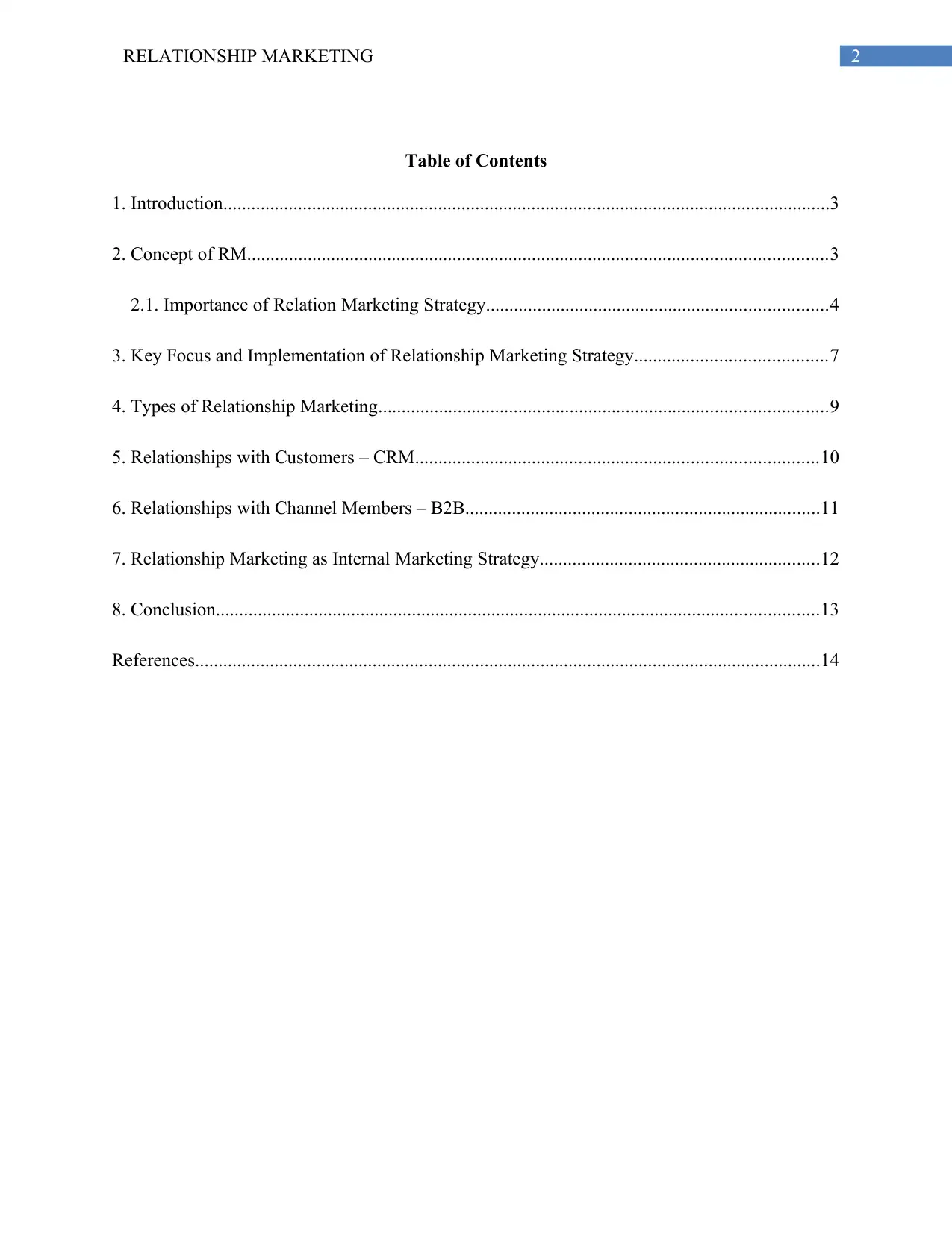
2RELATIONSHIP MARKETING
Table of Contents
1. Introduction..................................................................................................................................3
2. Concept of RM............................................................................................................................3
2.1. Importance of Relation Marketing Strategy.........................................................................4
3. Key Focus and Implementation of Relationship Marketing Strategy.........................................7
4. Types of Relationship Marketing................................................................................................9
5. Relationships with Customers – CRM......................................................................................10
6. Relationships with Channel Members – B2B............................................................................11
7. Relationship Marketing as Internal Marketing Strategy............................................................12
8. Conclusion.................................................................................................................................13
References......................................................................................................................................14
Table of Contents
1. Introduction..................................................................................................................................3
2. Concept of RM............................................................................................................................3
2.1. Importance of Relation Marketing Strategy.........................................................................4
3. Key Focus and Implementation of Relationship Marketing Strategy.........................................7
4. Types of Relationship Marketing................................................................................................9
5. Relationships with Customers – CRM......................................................................................10
6. Relationships with Channel Members – B2B............................................................................11
7. Relationship Marketing as Internal Marketing Strategy............................................................12
8. Conclusion.................................................................................................................................13
References......................................................................................................................................14
⊘ This is a preview!⊘
Do you want full access?
Subscribe today to unlock all pages.

Trusted by 1+ million students worldwide
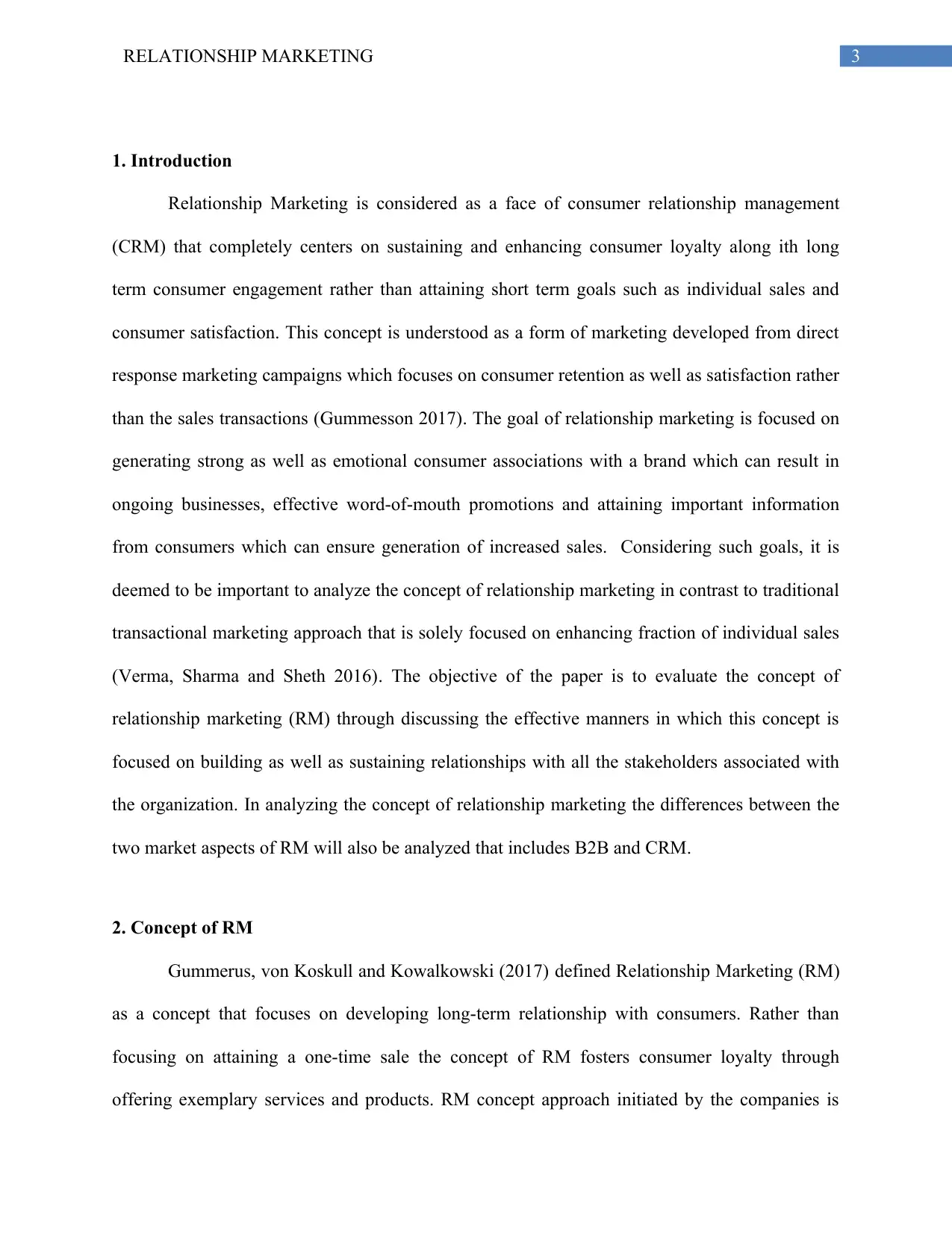
3RELATIONSHIP MARKETING
1. Introduction
Relationship Marketing is considered as a face of consumer relationship management
(CRM) that completely centers on sustaining and enhancing consumer loyalty along ith long
term consumer engagement rather than attaining short term goals such as individual sales and
consumer satisfaction. This concept is understood as a form of marketing developed from direct
response marketing campaigns which focuses on consumer retention as well as satisfaction rather
than the sales transactions (Gummesson 2017). The goal of relationship marketing is focused on
generating strong as well as emotional consumer associations with a brand which can result in
ongoing businesses, effective word-of-mouth promotions and attaining important information
from consumers which can ensure generation of increased sales. Considering such goals, it is
deemed to be important to analyze the concept of relationship marketing in contrast to traditional
transactional marketing approach that is solely focused on enhancing fraction of individual sales
(Verma, Sharma and Sheth 2016). The objective of the paper is to evaluate the concept of
relationship marketing (RM) through discussing the effective manners in which this concept is
focused on building as well as sustaining relationships with all the stakeholders associated with
the organization. In analyzing the concept of relationship marketing the differences between the
two market aspects of RM will also be analyzed that includes B2B and CRM.
2. Concept of RM
Gummerus, von Koskull and Kowalkowski (2017) defined Relationship Marketing (RM)
as a concept that focuses on developing long-term relationship with consumers. Rather than
focusing on attaining a one-time sale the concept of RM fosters consumer loyalty through
offering exemplary services and products. RM concept approach initiated by the companies is
1. Introduction
Relationship Marketing is considered as a face of consumer relationship management
(CRM) that completely centers on sustaining and enhancing consumer loyalty along ith long
term consumer engagement rather than attaining short term goals such as individual sales and
consumer satisfaction. This concept is understood as a form of marketing developed from direct
response marketing campaigns which focuses on consumer retention as well as satisfaction rather
than the sales transactions (Gummesson 2017). The goal of relationship marketing is focused on
generating strong as well as emotional consumer associations with a brand which can result in
ongoing businesses, effective word-of-mouth promotions and attaining important information
from consumers which can ensure generation of increased sales. Considering such goals, it is
deemed to be important to analyze the concept of relationship marketing in contrast to traditional
transactional marketing approach that is solely focused on enhancing fraction of individual sales
(Verma, Sharma and Sheth 2016). The objective of the paper is to evaluate the concept of
relationship marketing (RM) through discussing the effective manners in which this concept is
focused on building as well as sustaining relationships with all the stakeholders associated with
the organization. In analyzing the concept of relationship marketing the differences between the
two market aspects of RM will also be analyzed that includes B2B and CRM.
2. Concept of RM
Gummerus, von Koskull and Kowalkowski (2017) defined Relationship Marketing (RM)
as a concept that focuses on developing long-term relationship with consumers. Rather than
focusing on attaining a one-time sale the concept of RM fosters consumer loyalty through
offering exemplary services and products. RM concept approach initiated by the companies is
Paraphrase This Document
Need a fresh take? Get an instant paraphrase of this document with our AI Paraphraser
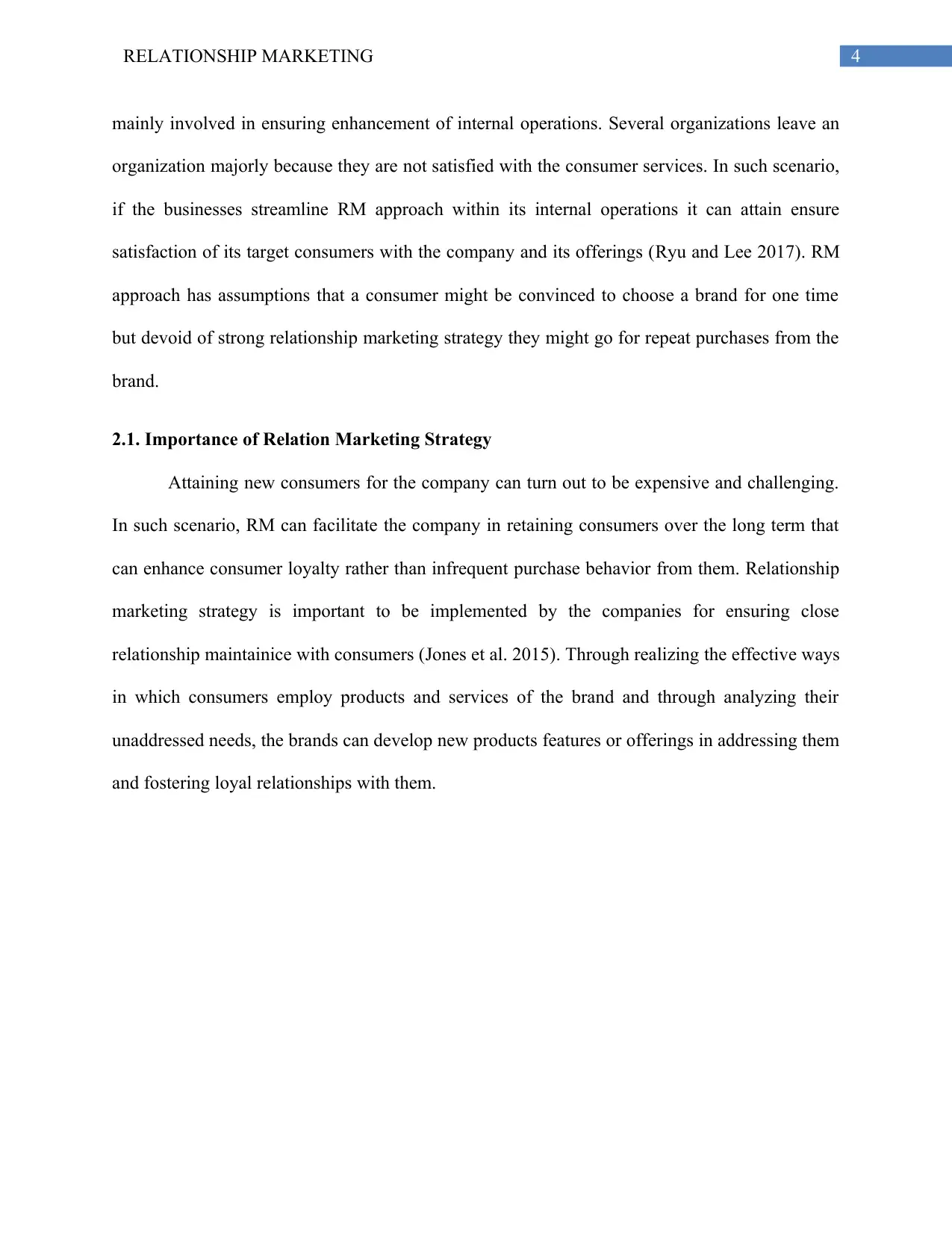
4RELATIONSHIP MARKETING
mainly involved in ensuring enhancement of internal operations. Several organizations leave an
organization majorly because they are not satisfied with the consumer services. In such scenario,
if the businesses streamline RM approach within its internal operations it can attain ensure
satisfaction of its target consumers with the company and its offerings (Ryu and Lee 2017). RM
approach has assumptions that a consumer might be convinced to choose a brand for one time
but devoid of strong relationship marketing strategy they might go for repeat purchases from the
brand.
2.1. Importance of Relation Marketing Strategy
Attaining new consumers for the company can turn out to be expensive and challenging.
In such scenario, RM can facilitate the company in retaining consumers over the long term that
can enhance consumer loyalty rather than infrequent purchase behavior from them. Relationship
marketing strategy is important to be implemented by the companies for ensuring close
relationship maintainice with consumers (Jones et al. 2015). Through realizing the effective ways
in which consumers employ products and services of the brand and through analyzing their
unaddressed needs, the brands can develop new products features or offerings in addressing them
and fostering loyal relationships with them.
mainly involved in ensuring enhancement of internal operations. Several organizations leave an
organization majorly because they are not satisfied with the consumer services. In such scenario,
if the businesses streamline RM approach within its internal operations it can attain ensure
satisfaction of its target consumers with the company and its offerings (Ryu and Lee 2017). RM
approach has assumptions that a consumer might be convinced to choose a brand for one time
but devoid of strong relationship marketing strategy they might go for repeat purchases from the
brand.
2.1. Importance of Relation Marketing Strategy
Attaining new consumers for the company can turn out to be expensive and challenging.
In such scenario, RM can facilitate the company in retaining consumers over the long term that
can enhance consumer loyalty rather than infrequent purchase behavior from them. Relationship
marketing strategy is important to be implemented by the companies for ensuring close
relationship maintainice with consumers (Jones et al. 2015). Through realizing the effective ways
in which consumers employ products and services of the brand and through analyzing their
unaddressed needs, the brands can develop new products features or offerings in addressing them
and fostering loyal relationships with them.
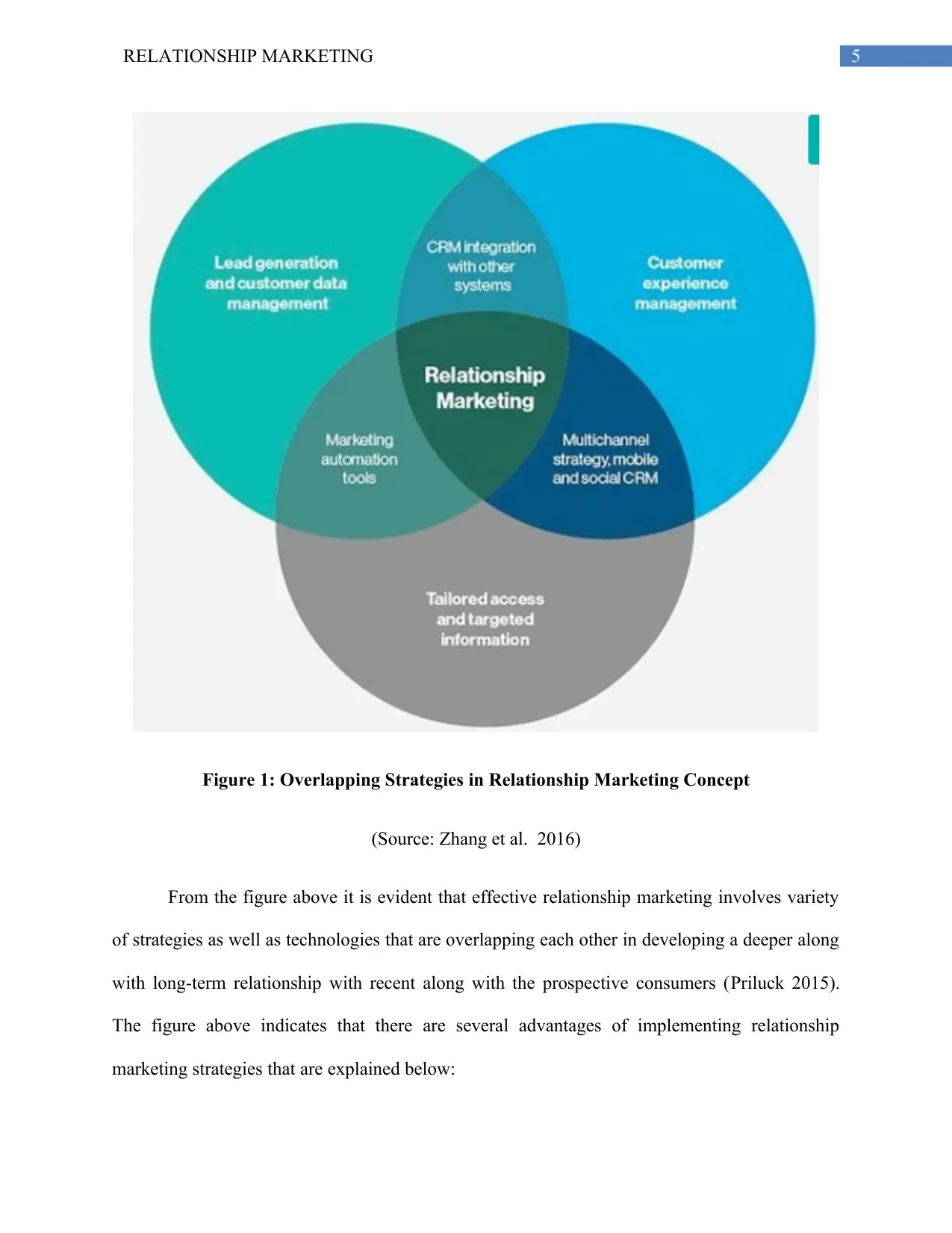
5RELATIONSHIP MARKETING
Figure 1: Overlapping Strategies in Relationship Marketing Concept
(Source: Zhang et al. 2016)
From the figure above it is evident that effective relationship marketing involves variety
of strategies as well as technologies that are overlapping each other in developing a deeper along
with long-term relationship with recent along with the prospective consumers (Priluck 2015).
The figure above indicates that there are several advantages of implementing relationship
marketing strategies that are explained below:
Figure 1: Overlapping Strategies in Relationship Marketing Concept
(Source: Zhang et al. 2016)
From the figure above it is evident that effective relationship marketing involves variety
of strategies as well as technologies that are overlapping each other in developing a deeper along
with long-term relationship with recent along with the prospective consumers (Priluck 2015).
The figure above indicates that there are several advantages of implementing relationship
marketing strategies that are explained below:
⊘ This is a preview!⊘
Do you want full access?
Subscribe today to unlock all pages.

Trusted by 1+ million students worldwide
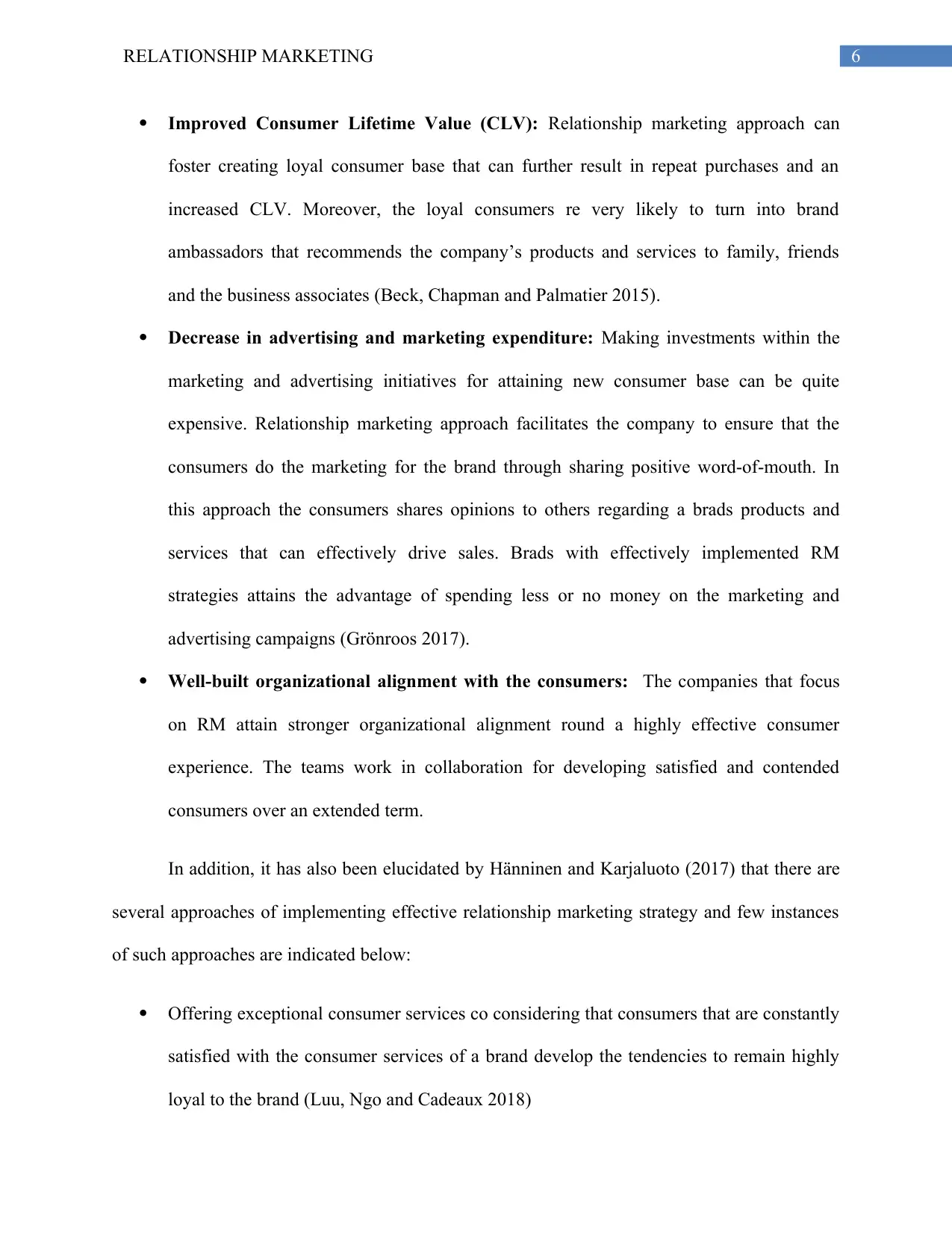
6RELATIONSHIP MARKETING
Improved Consumer Lifetime Value (CLV): Relationship marketing approach can
foster creating loyal consumer base that can further result in repeat purchases and an
increased CLV. Moreover, the loyal consumers re very likely to turn into brand
ambassadors that recommends the company’s products and services to family, friends
and the business associates (Beck, Chapman and Palmatier 2015).
Decrease in advertising and marketing expenditure: Making investments within the
marketing and advertising initiatives for attaining new consumer base can be quite
expensive. Relationship marketing approach facilitates the company to ensure that the
consumers do the marketing for the brand through sharing positive word-of-mouth. In
this approach the consumers shares opinions to others regarding a brads products and
services that can effectively drive sales. Brads with effectively implemented RM
strategies attains the advantage of spending less or no money on the marketing and
advertising campaigns (Grönroos 2017).
Well-built organizational alignment with the consumers: The companies that focus
on RM attain stronger organizational alignment round a highly effective consumer
experience. The teams work in collaboration for developing satisfied and contended
consumers over an extended term.
In addition, it has also been elucidated by Hänninen and Karjaluoto (2017) that there are
several approaches of implementing effective relationship marketing strategy and few instances
of such approaches are indicated below:
Offering exceptional consumer services co considering that consumers that are constantly
satisfied with the consumer services of a brand develop the tendencies to remain highly
loyal to the brand (Luu, Ngo and Cadeaux 2018)
Improved Consumer Lifetime Value (CLV): Relationship marketing approach can
foster creating loyal consumer base that can further result in repeat purchases and an
increased CLV. Moreover, the loyal consumers re very likely to turn into brand
ambassadors that recommends the company’s products and services to family, friends
and the business associates (Beck, Chapman and Palmatier 2015).
Decrease in advertising and marketing expenditure: Making investments within the
marketing and advertising initiatives for attaining new consumer base can be quite
expensive. Relationship marketing approach facilitates the company to ensure that the
consumers do the marketing for the brand through sharing positive word-of-mouth. In
this approach the consumers shares opinions to others regarding a brads products and
services that can effectively drive sales. Brads with effectively implemented RM
strategies attains the advantage of spending less or no money on the marketing and
advertising campaigns (Grönroos 2017).
Well-built organizational alignment with the consumers: The companies that focus
on RM attain stronger organizational alignment round a highly effective consumer
experience. The teams work in collaboration for developing satisfied and contended
consumers over an extended term.
In addition, it has also been elucidated by Hänninen and Karjaluoto (2017) that there are
several approaches of implementing effective relationship marketing strategy and few instances
of such approaches are indicated below:
Offering exceptional consumer services co considering that consumers that are constantly
satisfied with the consumer services of a brand develop the tendencies to remain highly
loyal to the brand (Luu, Ngo and Cadeaux 2018)
Paraphrase This Document
Need a fresh take? Get an instant paraphrase of this document with our AI Paraphraser
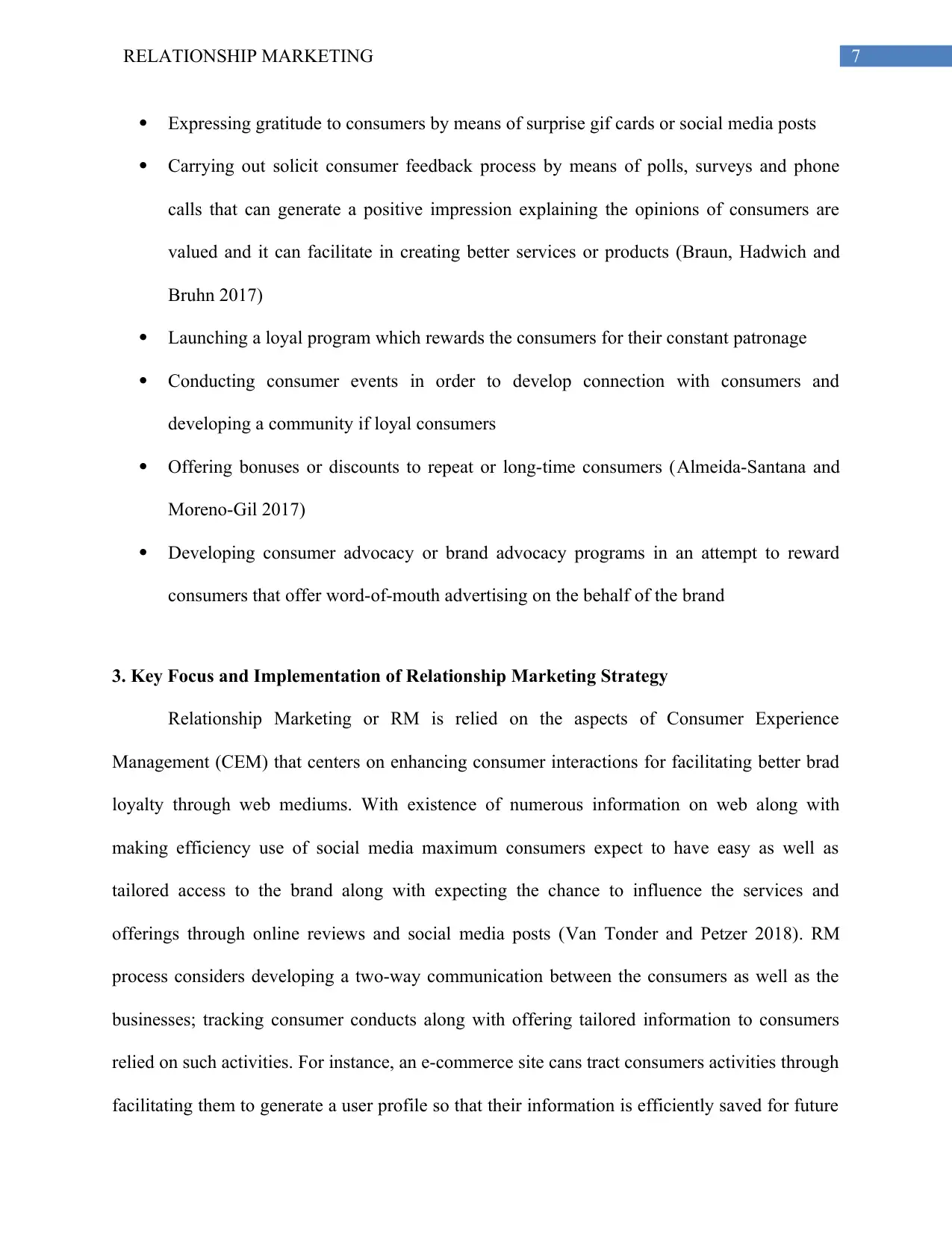
7RELATIONSHIP MARKETING
Expressing gratitude to consumers by means of surprise gif cards or social media posts
Carrying out solicit consumer feedback process by means of polls, surveys and phone
calls that can generate a positive impression explaining the opinions of consumers are
valued and it can facilitate in creating better services or products (Braun, Hadwich and
Bruhn 2017)
Launching a loyal program which rewards the consumers for their constant patronage
Conducting consumer events in order to develop connection with consumers and
developing a community if loyal consumers
Offering bonuses or discounts to repeat or long-time consumers (Almeida-Santana and
Moreno-Gil 2017)
Developing consumer advocacy or brand advocacy programs in an attempt to reward
consumers that offer word-of-mouth advertising on the behalf of the brand
3. Key Focus and Implementation of Relationship Marketing Strategy
Relationship Marketing or RM is relied on the aspects of Consumer Experience
Management (CEM) that centers on enhancing consumer interactions for facilitating better brad
loyalty through web mediums. With existence of numerous information on web along with
making efficiency use of social media maximum consumers expect to have easy as well as
tailored access to the brand along with expecting the chance to influence the services and
offerings through online reviews and social media posts (Van Tonder and Petzer 2018). RM
process considers developing a two-way communication between the consumers as well as the
businesses; tracking consumer conducts along with offering tailored information to consumers
relied on such activities. For instance, an e-commerce site cans tract consumers activities through
facilitating them to generate a user profile so that their information is efficiently saved for future
Expressing gratitude to consumers by means of surprise gif cards or social media posts
Carrying out solicit consumer feedback process by means of polls, surveys and phone
calls that can generate a positive impression explaining the opinions of consumers are
valued and it can facilitate in creating better services or products (Braun, Hadwich and
Bruhn 2017)
Launching a loyal program which rewards the consumers for their constant patronage
Conducting consumer events in order to develop connection with consumers and
developing a community if loyal consumers
Offering bonuses or discounts to repeat or long-time consumers (Almeida-Santana and
Moreno-Gil 2017)
Developing consumer advocacy or brand advocacy programs in an attempt to reward
consumers that offer word-of-mouth advertising on the behalf of the brand
3. Key Focus and Implementation of Relationship Marketing Strategy
Relationship Marketing or RM is relied on the aspects of Consumer Experience
Management (CEM) that centers on enhancing consumer interactions for facilitating better brad
loyalty through web mediums. With existence of numerous information on web along with
making efficiency use of social media maximum consumers expect to have easy as well as
tailored access to the brand along with expecting the chance to influence the services and
offerings through online reviews and social media posts (Van Tonder and Petzer 2018). RM
process considers developing a two-way communication between the consumers as well as the
businesses; tracking consumer conducts along with offering tailored information to consumers
relied on such activities. For instance, an e-commerce site cans tract consumers activities through
facilitating them to generate a user profile so that their information is efficiently saved for future
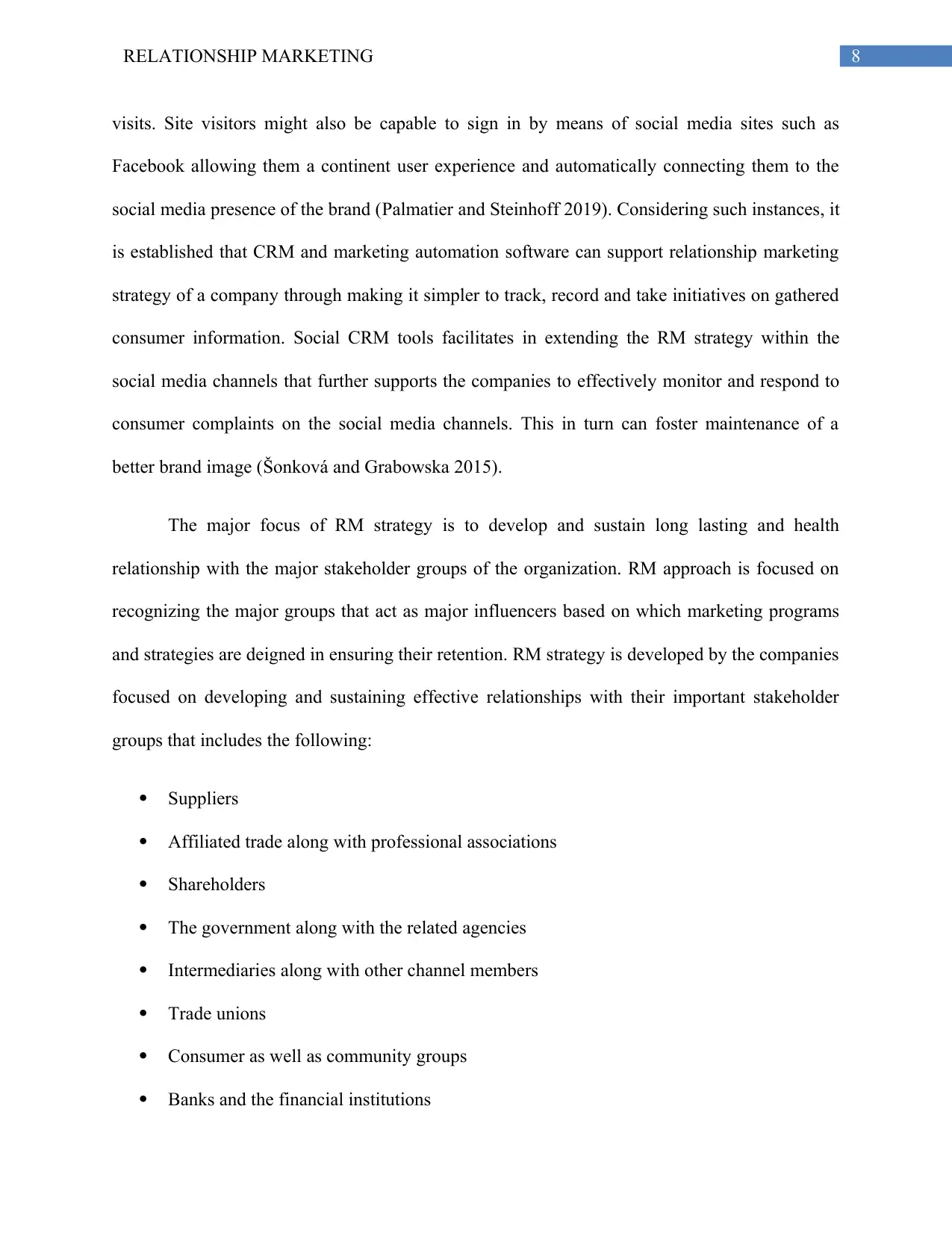
8RELATIONSHIP MARKETING
visits. Site visitors might also be capable to sign in by means of social media sites such as
Facebook allowing them a continent user experience and automatically connecting them to the
social media presence of the brand (Palmatier and Steinhoff 2019). Considering such instances, it
is established that CRM and marketing automation software can support relationship marketing
strategy of a company through making it simpler to track, record and take initiatives on gathered
consumer information. Social CRM tools facilitates in extending the RM strategy within the
social media channels that further supports the companies to effectively monitor and respond to
consumer complaints on the social media channels. This in turn can foster maintenance of a
better brand image (Šonková and Grabowska 2015).
The major focus of RM strategy is to develop and sustain long lasting and health
relationship with the major stakeholder groups of the organization. RM approach is focused on
recognizing the major groups that act as major influencers based on which marketing programs
and strategies are deigned in ensuring their retention. RM strategy is developed by the companies
focused on developing and sustaining effective relationships with their important stakeholder
groups that includes the following:
Suppliers
Affiliated trade along with professional associations
Shareholders
The government along with the related agencies
Intermediaries along with other channel members
Trade unions
Consumer as well as community groups
Banks and the financial institutions
visits. Site visitors might also be capable to sign in by means of social media sites such as
Facebook allowing them a continent user experience and automatically connecting them to the
social media presence of the brand (Palmatier and Steinhoff 2019). Considering such instances, it
is established that CRM and marketing automation software can support relationship marketing
strategy of a company through making it simpler to track, record and take initiatives on gathered
consumer information. Social CRM tools facilitates in extending the RM strategy within the
social media channels that further supports the companies to effectively monitor and respond to
consumer complaints on the social media channels. This in turn can foster maintenance of a
better brand image (Šonková and Grabowska 2015).
The major focus of RM strategy is to develop and sustain long lasting and health
relationship with the major stakeholder groups of the organization. RM approach is focused on
recognizing the major groups that act as major influencers based on which marketing programs
and strategies are deigned in ensuring their retention. RM strategy is developed by the companies
focused on developing and sustaining effective relationships with their important stakeholder
groups that includes the following:
Suppliers
Affiliated trade along with professional associations
Shareholders
The government along with the related agencies
Intermediaries along with other channel members
Trade unions
Consumer as well as community groups
Banks and the financial institutions
⊘ This is a preview!⊘
Do you want full access?
Subscribe today to unlock all pages.

Trusted by 1+ million students worldwide
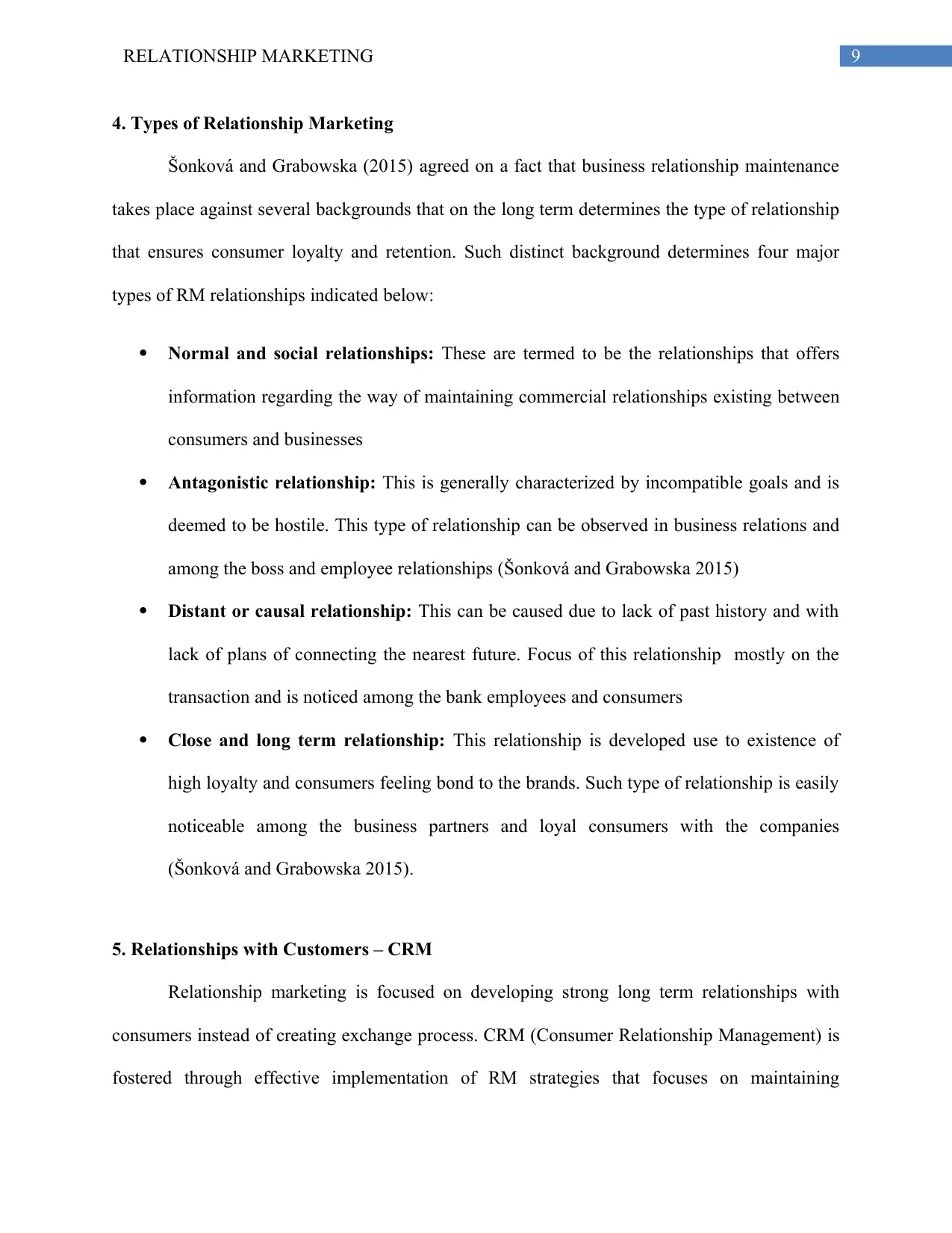
9RELATIONSHIP MARKETING
4. Types of Relationship Marketing
Šonková and Grabowska (2015) agreed on a fact that business relationship maintenance
takes place against several backgrounds that on the long term determines the type of relationship
that ensures consumer loyalty and retention. Such distinct background determines four major
types of RM relationships indicated below:
Normal and social relationships: These are termed to be the relationships that offers
information regarding the way of maintaining commercial relationships existing between
consumers and businesses
Antagonistic relationship: This is generally characterized by incompatible goals and is
deemed to be hostile. This type of relationship can be observed in business relations and
among the boss and employee relationships (Šonková and Grabowska 2015)
Distant or causal relationship: This can be caused due to lack of past history and with
lack of plans of connecting the nearest future. Focus of this relationship mostly on the
transaction and is noticed among the bank employees and consumers
Close and long term relationship: This relationship is developed use to existence of
high loyalty and consumers feeling bond to the brands. Such type of relationship is easily
noticeable among the business partners and loyal consumers with the companies
(Šonková and Grabowska 2015).
5. Relationships with Customers – CRM
Relationship marketing is focused on developing strong long term relationships with
consumers instead of creating exchange process. CRM (Consumer Relationship Management) is
fostered through effective implementation of RM strategies that focuses on maintaining
4. Types of Relationship Marketing
Šonková and Grabowska (2015) agreed on a fact that business relationship maintenance
takes place against several backgrounds that on the long term determines the type of relationship
that ensures consumer loyalty and retention. Such distinct background determines four major
types of RM relationships indicated below:
Normal and social relationships: These are termed to be the relationships that offers
information regarding the way of maintaining commercial relationships existing between
consumers and businesses
Antagonistic relationship: This is generally characterized by incompatible goals and is
deemed to be hostile. This type of relationship can be observed in business relations and
among the boss and employee relationships (Šonková and Grabowska 2015)
Distant or causal relationship: This can be caused due to lack of past history and with
lack of plans of connecting the nearest future. Focus of this relationship mostly on the
transaction and is noticed among the bank employees and consumers
Close and long term relationship: This relationship is developed use to existence of
high loyalty and consumers feeling bond to the brands. Such type of relationship is easily
noticeable among the business partners and loyal consumers with the companies
(Šonková and Grabowska 2015).
5. Relationships with Customers – CRM
Relationship marketing is focused on developing strong long term relationships with
consumers instead of creating exchange process. CRM (Consumer Relationship Management) is
fostered through effective implementation of RM strategies that focuses on maintaining
Paraphrase This Document
Need a fresh take? Get an instant paraphrase of this document with our AI Paraphraser
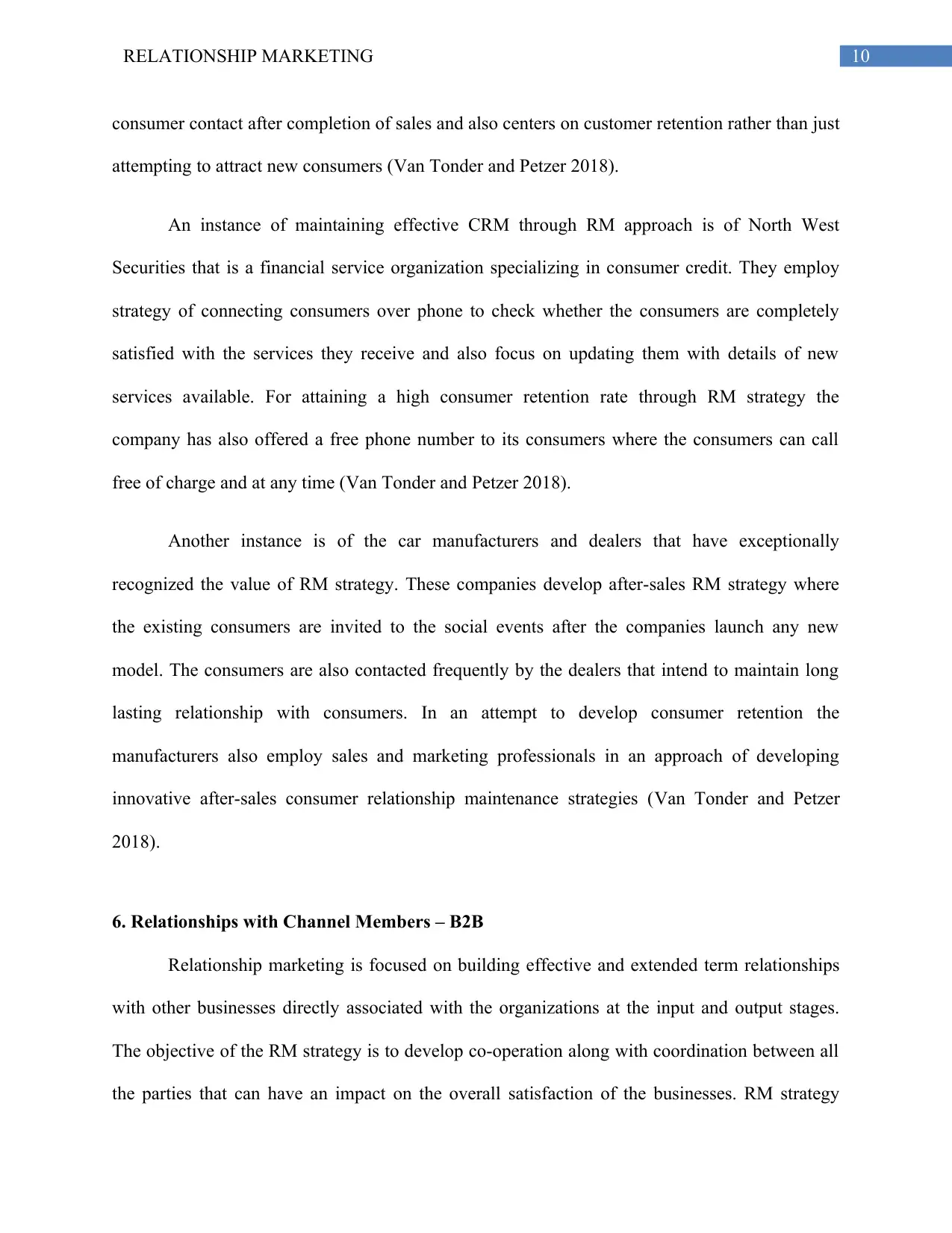
10RELATIONSHIP MARKETING
consumer contact after completion of sales and also centers on customer retention rather than just
attempting to attract new consumers (Van Tonder and Petzer 2018).
An instance of maintaining effective CRM through RM approach is of North West
Securities that is a financial service organization specializing in consumer credit. They employ
strategy of connecting consumers over phone to check whether the consumers are completely
satisfied with the services they receive and also focus on updating them with details of new
services available. For attaining a high consumer retention rate through RM strategy the
company has also offered a free phone number to its consumers where the consumers can call
free of charge and at any time (Van Tonder and Petzer 2018).
Another instance is of the car manufacturers and dealers that have exceptionally
recognized the value of RM strategy. These companies develop after-sales RM strategy where
the existing consumers are invited to the social events after the companies launch any new
model. The consumers are also contacted frequently by the dealers that intend to maintain long
lasting relationship with consumers. In an attempt to develop consumer retention the
manufacturers also employ sales and marketing professionals in an approach of developing
innovative after-sales consumer relationship maintenance strategies (Van Tonder and Petzer
2018).
6. Relationships with Channel Members – B2B
Relationship marketing is focused on building effective and extended term relationships
with other businesses directly associated with the organizations at the input and output stages.
The objective of the RM strategy is to develop co-operation along with coordination between all
the parties that can have an impact on the overall satisfaction of the businesses. RM strategy
consumer contact after completion of sales and also centers on customer retention rather than just
attempting to attract new consumers (Van Tonder and Petzer 2018).
An instance of maintaining effective CRM through RM approach is of North West
Securities that is a financial service organization specializing in consumer credit. They employ
strategy of connecting consumers over phone to check whether the consumers are completely
satisfied with the services they receive and also focus on updating them with details of new
services available. For attaining a high consumer retention rate through RM strategy the
company has also offered a free phone number to its consumers where the consumers can call
free of charge and at any time (Van Tonder and Petzer 2018).
Another instance is of the car manufacturers and dealers that have exceptionally
recognized the value of RM strategy. These companies develop after-sales RM strategy where
the existing consumers are invited to the social events after the companies launch any new
model. The consumers are also contacted frequently by the dealers that intend to maintain long
lasting relationship with consumers. In an attempt to develop consumer retention the
manufacturers also employ sales and marketing professionals in an approach of developing
innovative after-sales consumer relationship maintenance strategies (Van Tonder and Petzer
2018).
6. Relationships with Channel Members – B2B
Relationship marketing is focused on building effective and extended term relationships
with other businesses directly associated with the organizations at the input and output stages.
The objective of the RM strategy is to develop co-operation along with coordination between all
the parties that can have an impact on the overall satisfaction of the businesses. RM strategy
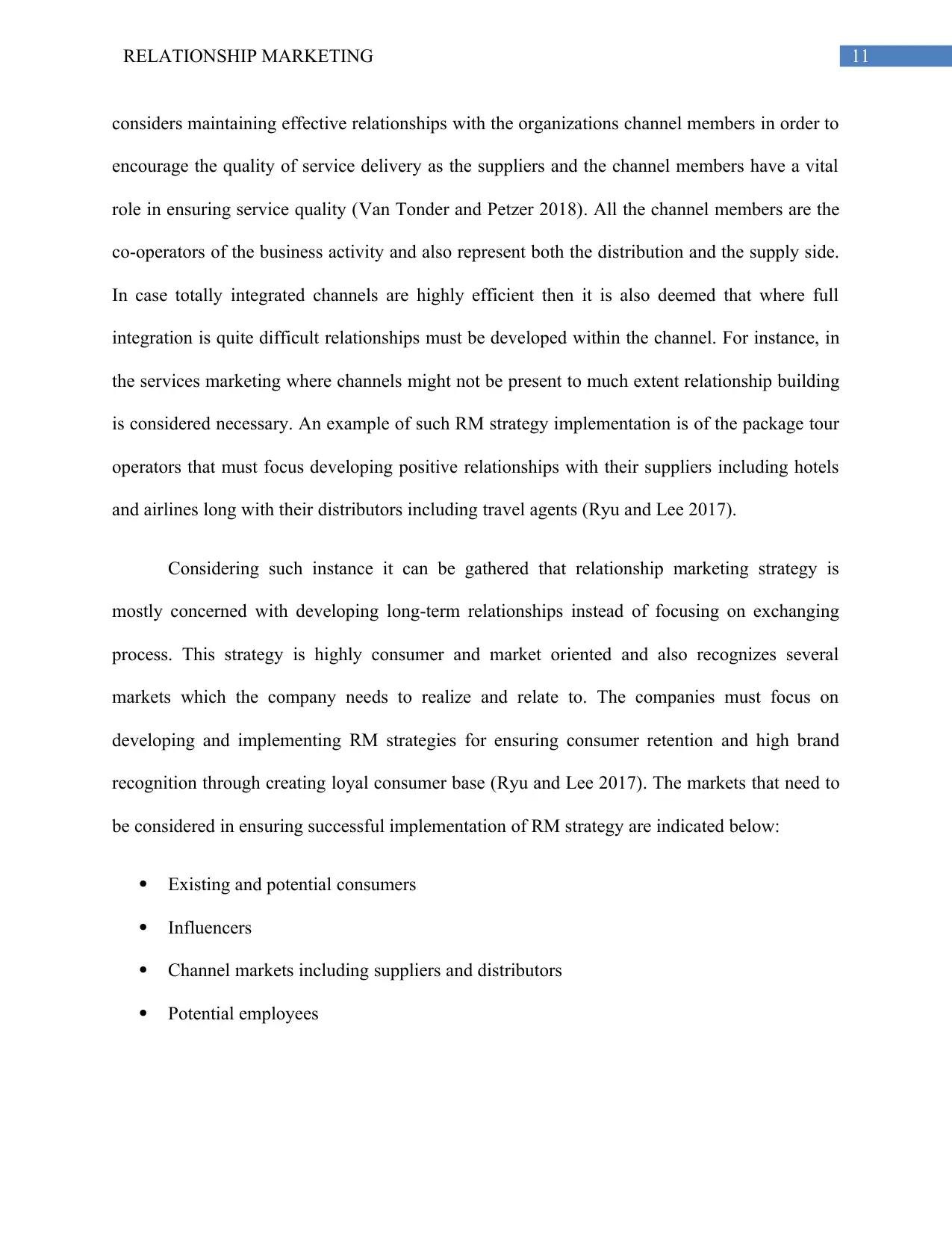
11RELATIONSHIP MARKETING
considers maintaining effective relationships with the organizations channel members in order to
encourage the quality of service delivery as the suppliers and the channel members have a vital
role in ensuring service quality (Van Tonder and Petzer 2018). All the channel members are the
co-operators of the business activity and also represent both the distribution and the supply side.
In case totally integrated channels are highly efficient then it is also deemed that where full
integration is quite difficult relationships must be developed within the channel. For instance, in
the services marketing where channels might not be present to much extent relationship building
is considered necessary. An example of such RM strategy implementation is of the package tour
operators that must focus developing positive relationships with their suppliers including hotels
and airlines long with their distributors including travel agents (Ryu and Lee 2017).
Considering such instance it can be gathered that relationship marketing strategy is
mostly concerned with developing long-term relationships instead of focusing on exchanging
process. This strategy is highly consumer and market oriented and also recognizes several
markets which the company needs to realize and relate to. The companies must focus on
developing and implementing RM strategies for ensuring consumer retention and high brand
recognition through creating loyal consumer base (Ryu and Lee 2017). The markets that need to
be considered in ensuring successful implementation of RM strategy are indicated below:
Existing and potential consumers
Influencers
Channel markets including suppliers and distributors
Potential employees
considers maintaining effective relationships with the organizations channel members in order to
encourage the quality of service delivery as the suppliers and the channel members have a vital
role in ensuring service quality (Van Tonder and Petzer 2018). All the channel members are the
co-operators of the business activity and also represent both the distribution and the supply side.
In case totally integrated channels are highly efficient then it is also deemed that where full
integration is quite difficult relationships must be developed within the channel. For instance, in
the services marketing where channels might not be present to much extent relationship building
is considered necessary. An example of such RM strategy implementation is of the package tour
operators that must focus developing positive relationships with their suppliers including hotels
and airlines long with their distributors including travel agents (Ryu and Lee 2017).
Considering such instance it can be gathered that relationship marketing strategy is
mostly concerned with developing long-term relationships instead of focusing on exchanging
process. This strategy is highly consumer and market oriented and also recognizes several
markets which the company needs to realize and relate to. The companies must focus on
developing and implementing RM strategies for ensuring consumer retention and high brand
recognition through creating loyal consumer base (Ryu and Lee 2017). The markets that need to
be considered in ensuring successful implementation of RM strategy are indicated below:
Existing and potential consumers
Influencers
Channel markets including suppliers and distributors
Potential employees
⊘ This is a preview!⊘
Do you want full access?
Subscribe today to unlock all pages.

Trusted by 1+ million students worldwide
1 out of 17
Related Documents
Your All-in-One AI-Powered Toolkit for Academic Success.
+13062052269
info@desklib.com
Available 24*7 on WhatsApp / Email
![[object Object]](/_next/static/media/star-bottom.7253800d.svg)
Unlock your academic potential
Copyright © 2020–2025 A2Z Services. All Rights Reserved. Developed and managed by ZUCOL.





